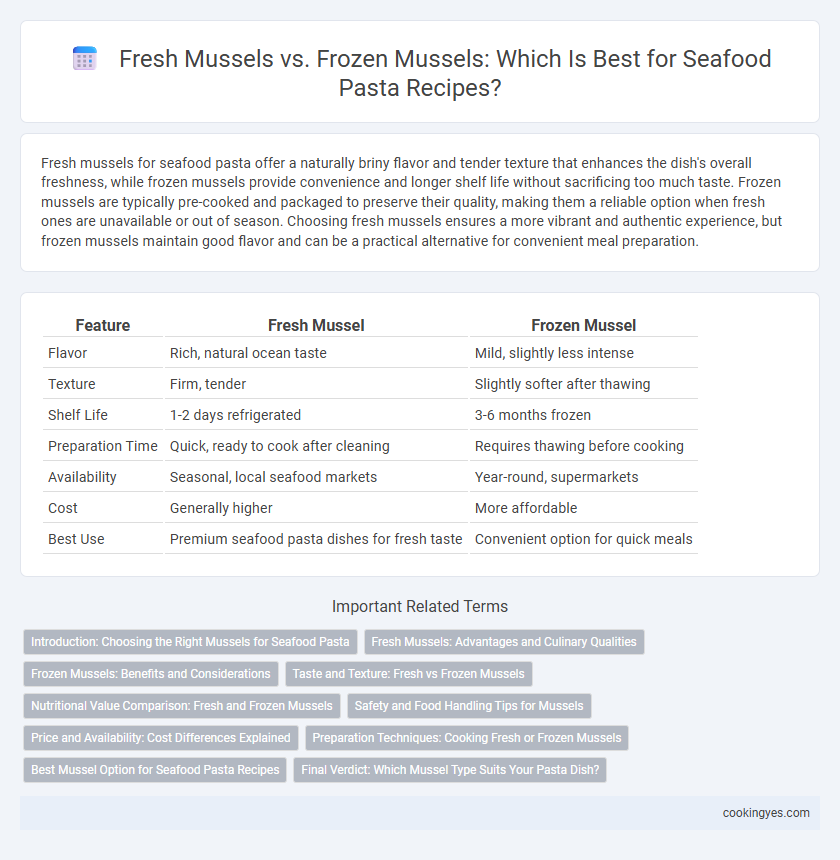Fresh mussels for seafood pasta offer a naturally briny flavor and tender texture that enhances the dish's overall freshness, while frozen mussels provide convenience and longer shelf life without sacrificing too much taste. Frozen mussels are typically pre-cooked and packaged to preserve their quality, making them a reliable option when fresh ones are unavailable or out of season. Choosing fresh mussels ensures a more vibrant and authentic experience, but frozen mussels maintain good flavor and can be a practical alternative for convenient meal preparation.
Table of Comparison
| Feature | Fresh Mussel | Frozen Mussel |
|---|---|---|
| Flavor | Rich, natural ocean taste | Mild, slightly less intense |
| Texture | Firm, tender | Slightly softer after thawing |
| Shelf Life | 1-2 days refrigerated | 3-6 months frozen |
| Preparation Time | Quick, ready to cook after cleaning | Requires thawing before cooking |
| Availability | Seasonal, local seafood markets | Year-round, supermarkets |
| Cost | Generally higher | More affordable |
| Best Use | Premium seafood pasta dishes for fresh taste | Convenient option for quick meals |
Introduction: Choosing the Right Mussels for Seafood Pasta
Fresh mussels provide a tender texture and vibrant ocean flavor that enhances seafood pasta dishes, offering an authentic taste experience. Frozen mussels, while convenient and available year-round, may have a slightly altered texture but retain essential nutrients, making them a practical choice for busy kitchens. Selecting mussels based on freshness and intended preparation ensures optimal flavor and safety in seafood pasta recipes.
Fresh Mussels: Advantages and Culinary Qualities
Fresh mussels deliver superior texture and flavor for seafood pasta, offering a tender yet slightly chewy bite that enhances the dish's overall appeal. Their natural briny taste and umami richness elevate sauces and complement other ingredients without overpowering the palate. Additionally, fresh mussels cook quickly, ensuring optimal juiciness and minimizing the risk of rubberiness often associated with frozen varieties.
Frozen Mussels: Benefits and Considerations
Frozen mussels offer year-round availability and consistent quality, making them a convenient option for seafood pasta dishes. They retain freshness through rapid freezing techniques, preserving flavor and texture while reducing the risk of spoilage. Considerations include ensuring proper thawing to maintain their plumpness and avoiding excess moisture that can affect the sauce's consistency.
Taste and Texture: Fresh vs Frozen Mussels
Fresh mussels offer a naturally briny and sweet flavor with a tender, slightly chewy texture that enhances seafood pasta dishes. Frozen mussels, while convenient, often lose some of their subtle taste and can develop a firmer, sometimes rubbery texture after thawing. Choosing fresh mussels ensures a more vibrant and delicate seafood experience in pasta recipes.
Nutritional Value Comparison: Fresh and Frozen Mussels
Fresh mussels typically retain higher levels of vitamin B12 and omega-3 fatty acids compared to frozen mussels, which may experience slight nutrient degradation during the freezing process. Both fresh and frozen mussels provide comparable amounts of protein and essential minerals such as iron, zinc, and selenium, crucial for seafood pasta dishes. Choosing fresh mussels enhances the nutritional profile with more bioavailable nutrients, while frozen mussels offer convenience and longer shelf life without significant compromise in overall nutritional value.
Safety and Food Handling Tips for Mussels
Fresh mussels offer superior taste and texture for seafood pasta, but require careful inspection to ensure shells are closed and alive, reducing the risk of consuming spoiled shellfish. Frozen mussels provide convenience and a longer shelf life, generally pre-cooked for safety, minimizing bacterial contamination concerns during handling. Proper thawing in the refrigerator and cooking mussels until shells open are critical steps to guarantee safety and enhance flavor in any seafood pasta dish.
Price and Availability: Cost Differences Explained
Fresh mussels generally cost more than frozen mussels due to their limited shelf life and higher handling requirements, making them less accessible in many regions. Frozen mussels offer greater availability year-round and often come at a lower price point, providing a budget-friendly option without sacrificing quality. Price differences between fresh and frozen mussels can significantly impact the overall cost of seafood pasta, especially for bulk purchases.
Preparation Techniques: Cooking Fresh or Frozen Mussels
Fresh mussels require thorough cleaning and debearding before steaming to ensure optimal flavor and texture in seafood pasta dishes. Frozen mussels, often pre-cooked and shucked, need careful thawing and gentle reheating to maintain their tenderness without overcooking. Proper preparation techniques preserve the briny sweetness of both fresh and frozen mussels, enhancing the overall taste of the pasta.
Best Mussel Option for Seafood Pasta Recipes
Fresh mussels offer superior texture and flavor for seafood pasta recipes, delivering a natural brininess that enhances the dish's overall taste. Frozen mussels provide convenience and longer shelf life but may lose some of their firmness and fresh ocean aroma during freezing. For the best culinary results, using fresh mussels harvested within 24 hours ensures optimal tenderness and vibrant flavor in pasta preparations.
Final Verdict: Which Mussel Type Suits Your Pasta Dish?
Fresh mussels offer a tender texture and vibrant ocean flavor that enhances seafood pasta, while frozen mussels provide convenience with a longer shelf life and consistent quality. For recipes emphasizing delicate taste and presentation, fresh mussels are ideal, but frozen mussels remain a reliable alternative for quick preparation without sacrificing much flavor. Selecting fresh or frozen mussels depends on your priorities for authenticity versus practicality in your pasta dish.
Fresh Mussel vs Frozen Mussel for seafood pasta Infographic

 cookingyes.com
cookingyes.com